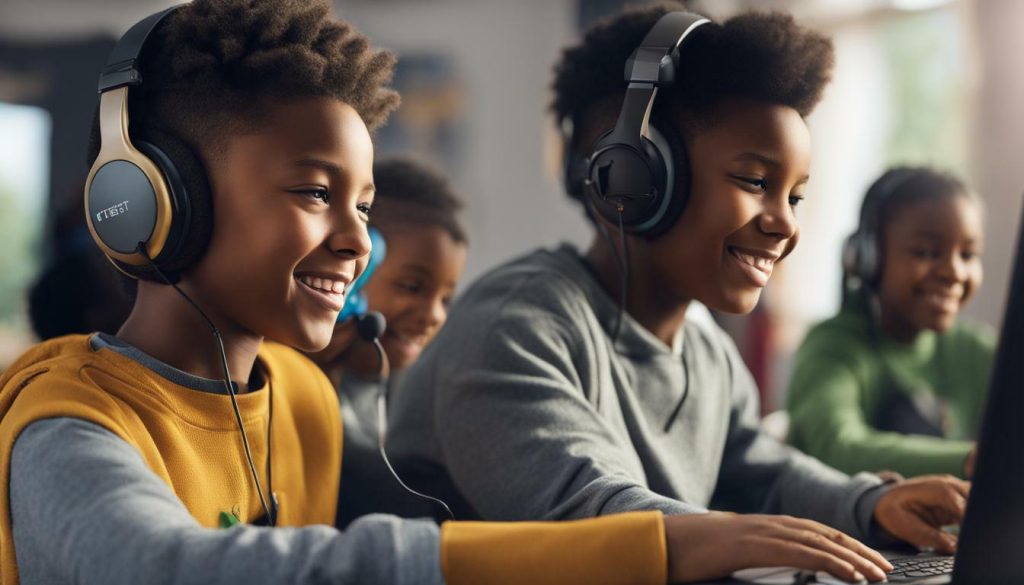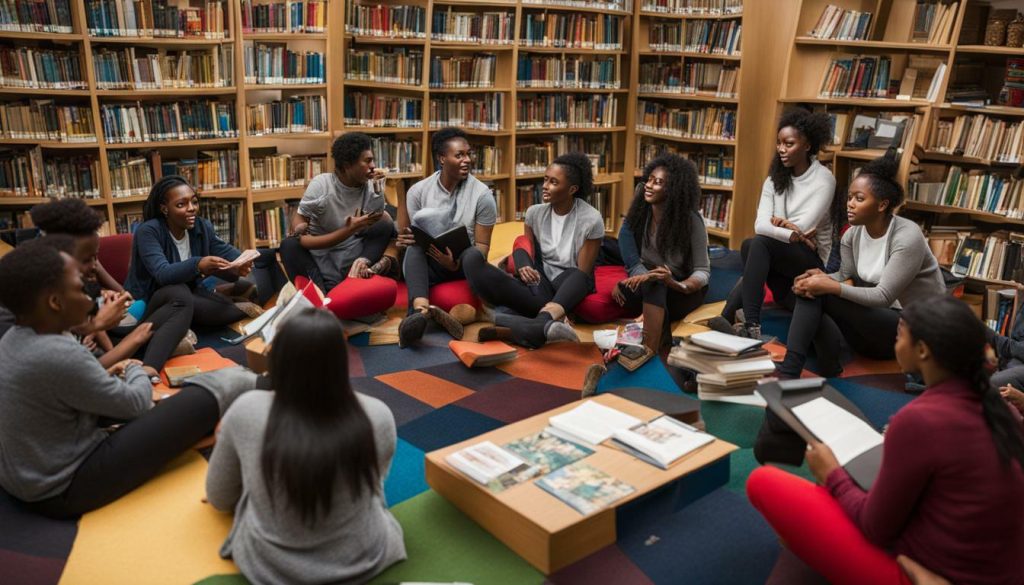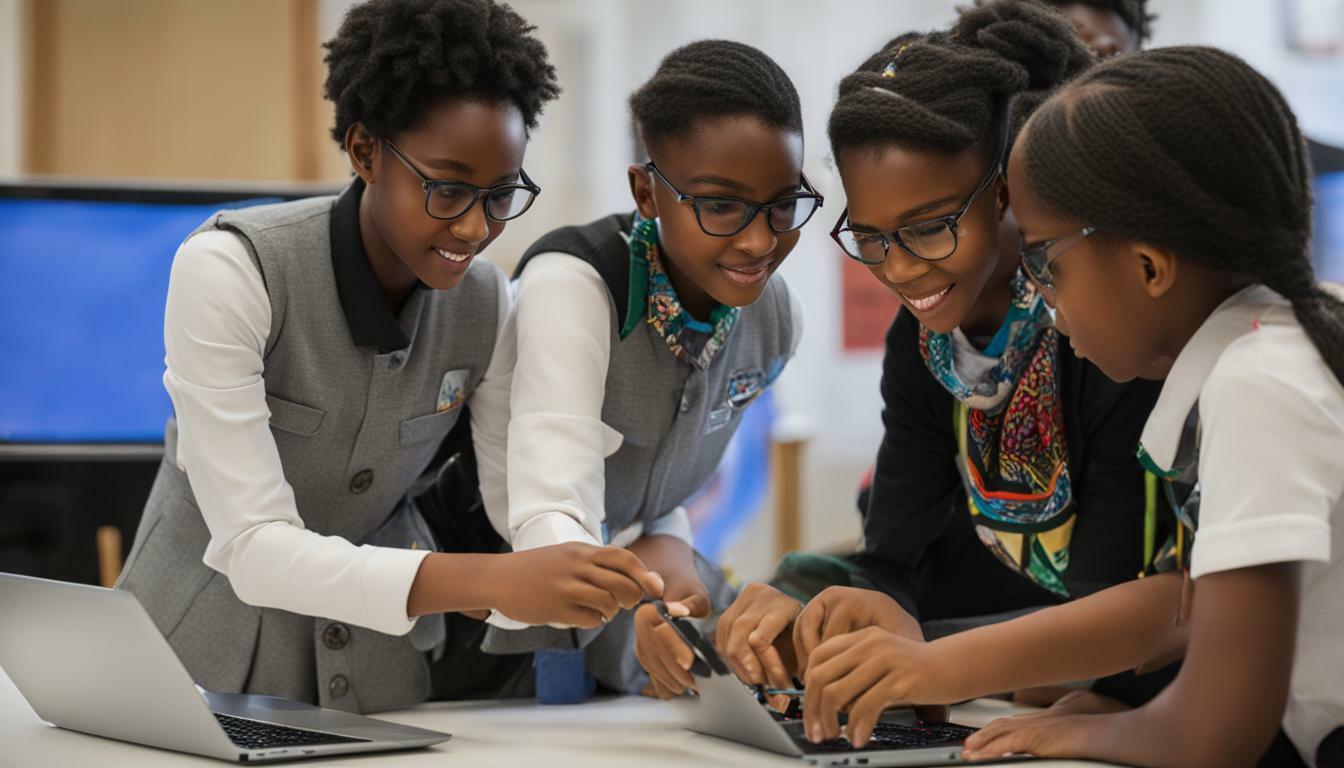Learning through user interactions is revolutionizing education in South Africa, offering a transformative approach that empowers learners to actively participate in their own educational journey. Through interactive learning experiences and user-engaged educational practices, students are able to take control of their learning and develop a deep understanding of the subjects they are studying. This learner-centric approach focuses on creating interactive educational experiences that foster collaboration, critical thinking, and problem-solving skills.
In South Africa, e-learning has emerged as a key component of this interactive teaching and learning approach. However, the digital revolution in education also brings challenges, such as the digital divide and the lack of necessary skills among learners and teachers. In a multilingual country like South Africa, language barriers further complicate the implementation of interactive learning initiatives.
Despite these challenges, the benefits of interactive learning and personalized education are undeniable. Interactive learning offers increased access to quality education, allowing learners to tailor their educational experiences to their individual needs. It also presents cost savings for both learners and educational institutions.
To fully unlock the potential of e-learning, collaboration between government, the private sector, and educational institutions is crucial. By working together, these stakeholders can create an ecosystem that supports and enhances interactive teaching and learning practices. Additionally, meaningful social interactions and the integration of social and emotional learning are vital components of a successful educational experience.
- Learning through user interactions empowers learners to actively participate in their educational journey.
- E-learning in South Africa faces challenges such as the digital divide and language barriers.
- Interactive learning offers increased access to quality education and cost savings.
- Collaboration between government, the private sector, and educational institutions is essential in unlocking the potential of e-learning.
- Meaningful social interactions and social-emotional learning enhance the educational experience.
Overcoming Challenges to Implementing E-Learning in South Africa
The digital revolution in education has brought about significant advancements in e-learning, but South Africa faces challenges in fully implementing this transformative approach due to the digital divide, skills gap, and multilingualism. The country strives to bridge the gap between those who have access to digital technologies and those who do not, enabling equal opportunities for all learners.
The digital divide refers to the disparity in access to and utilization of digital technologies. In South Africa, this divide is particularly pronounced in rural and disadvantaged communities, where limited infrastructure and connectivity hinder the effective use of e-learning platforms. To address this challenge, the government, in collaboration with private sector partners, is investing in infrastructure development and expanding connectivity to underserved areas.
| Challenges | Solutions |
|---|---|
| Digital Divide | Investment in infrastructure development and expanded connectivity. |
| Skills Gap | Training and capacity-building programs for teachers and learners. |
| Multilingualism | Developing localized e-learning content in multiple languages. |
Another challenge faced by South Africa is the skills gap among learners and teachers. Many educators lack the necessary digital literacy skills to effectively utilize e-learning platforms, while learners may struggle to adapt to online learning environments. To address this, the government and educational institutions are implementing training and capacity-building programs that equip educators and learners with the skills needed to navigate the digital landscape.
Furthermore, South Africa’s linguistic diversity poses a challenge to the implementation of e-learning. With 11 official languages, it is crucial to develop localized e-learning content in multiple languages to ensure equal access to quality education. Efforts are underway to translate and adapt digital content to accommodate the linguistic needs of diverse learners across the country.
E-learning has the potential to transcend geographical barriers and provide equitable access to quality education, but overcoming challenges such as the digital divide, skills gap, and multilingualism is crucial for its success in South Africa.” – Education Minister
Despite these challenges, South Africa remains committed to harnessing the power of e-learning to provide inclusive and quality education for all. By addressing the digital divide, enhancing digital literacy skills, and embracing linguistic diversity, the country is paving the way for a future where e-learning can truly transform the educational landscape.

Interactive learning and personalized education offer numerous advantages in South Africa, providing increased access to quality education and cost savings for learners of all backgrounds. Through interactive learning experiences, students are actively engaged in the learning process, fostering a deeper understanding of the subject matter. This approach encourages critical thinking, problem-solving skills, and independent learning, empowering students to take ownership of their education.
Personalized education tailors the learning experience to individual needs, allowing students to learn at their own pace and focus on areas that require additional attention. This individualized approach promotes a sense of autonomy and self-efficacy, boosting students’ confidence and motivation. By addressing their specific learning styles and preferences, personalized education enhances students’ overall learning experience and outcomes.
Furthermore, interactive learning and personalized education can significantly increase access to quality education, especially in underserved areas where traditional educational resources may be limited. E-learning platforms and digital tools enable students to learn from anywhere, breaking down geographical barriers and providing educational opportunities to those who may have otherwise been excluded.
| Benefits of Interactive Learning and Personalized Education: |
|---|
| Enhanced student engagement |
| Development of critical thinking and problem-solving skills |
| Increased student autonomy and motivation |
| Individualized learning experiences |
| Greater access to quality education |
| Cost savings |
“Interactive learning and personalized education open doors to a world of possibilities for South African learners. By embracing technology and tailoring educational experiences to individual needs, we can provide quality education to all, regardless of their circumstances.”

One of the key advantages of interactive learning and personalized education is the increased access it offers to quality education. Traditional classroom settings may not always be able to accommodate the diverse learning needs of students. However, with e-learning platforms and digital resources, learners can access educational materials and engage in interactive activities at their own convenience.
This flexibility is particularly beneficial for disadvantaged students who may face barriers such as distance, lack of resources, or financial constraints. By providing online learning opportunities, personalized education ensures that every student, regardless of their background, has equal access to quality education.
The cost savings associated with e-learning also contribute to greater equity, as it reduces the financial burden on students and their families. By eliminating the need for physical resources and infrastructure, e-learning reduces the cost of education, making it more affordable and accessible to learners from all socioeconomic backgrounds.
Customized Learning Experiences
Personalized education allows for customized learning experiences that cater to the unique needs and interests of each student. By leveraging technology, educational platforms can collect data on student performance and preferences, enabling teachers to tailor instruction and provide targeted support.
With personalized learning, students can progress at their own pace, engaging with content that aligns with their individual learning styles. This customization fosters a more meaningful and impactful learning experience, as students are actively engaged and motivated to explore topics that resonate with their interests and goals.
Through interactive learning and personalized education, South Africa can harness the power of technology to unlock the potential of every learner, creating a more inclusive and equitable education system.
The Role of Collaboration in Unlocking E-Learning Potential
Collaboration between government, the private sector, and educational institutions is vital in unlocking the full potential of e-learning in South Africa, fostering an environment that supports interactive learning experiences. By working together, these stakeholders can address the challenges faced in implementing e-learning and create innovative solutions that empower learners and educators alike.
Government involvement is crucial in driving the adoption of e-learning initiatives and providing the necessary infrastructure and resources. Through policies and funding, the government can support the development of digital learning platforms and ensure equitable access to technology and connectivity across all educational institutions.
The private sector also plays a significant role in e-learning, leveraging its expertise and resources to develop interactive educational tools and platforms. By partnering with educational institutions, companies can contribute to the creation of user-friendly and learner-centric digital solutions that enhance the educational experience and bridge the digital divide.
Educational institutions are at the forefront of e-learning implementation, shaping curriculum design and pedagogical practices to maximize the benefits of interactive learning. By embracing collaboration with the government and the private sector, institutions can access valuable insights and resources, enabling them to provide high-quality education that meets the needs of a rapidly evolving digital landscape.
To illustrate the power of collaboration in unlocking e-learning potential, we can look to successful initiatives such as the Partnership for Higher Education in Africa (PHEA). This partnership has been instrumental in supporting the integration of educational technology in African universities. By sharing knowledge, best practices, and resources, PHEA has helped universities overcome challenges and leverage digital tools to enhance teaching and learning.

| Benefits of Collaboration | Government | Private Sector | Educational Institutions |
|---|---|---|---|
| Access to funding and resources | ✓ | ✓ | ✓ |
| Policy support and infrastructure development | ✓ | ||
| Expertise in technology development | ✓ | ||
| Curriculum design and pedagogical innovation | ✓ |
Effective collaboration among government, the private sector, and educational institutions is key to unlocking the full potential of e-learning in South Africa. By harnessing their collective strengths and resources, these stakeholders can drive innovation, overcome challenges, and create an inclusive and engaging educational ecosystem that empowers learners and prepares them for the digital age.
The Power of Social Interactions in Education
Meaningful social interactions and the integration of social and emotional learning play a crucial role in creating successful and fulfilling learning experiences for South African learners. In an increasingly digital world, where e-learning has become a transformative force, it is important not to underestimate the power of human connection and collaboration in education.
Research has shown that social interactions have a profound impact on learning outcomes. When learners engage with their peers, teachers, and the community, they are able to develop important interpersonal skills, such as communication, empathy, and teamwork. These skills are essential for navigating the complexities of the modern world and preparing learners for future success.
“Education is not just about acquiring knowledge; it is also about developing emotional intelligence and social skills. By creating a supportive and collaborative learning environment, we can foster the emotional well-being of learners and enhance their overall learning experience.”
By fostering a supportive and collaborative learning environment, educators can create a sense of belonging and encourage active participation. This can be achieved through various strategies, such as group projects, discussions, and peer-to-peer learning activities. These interactions not only enhance the learning process but also promote critical thinking, problem-solving, and creativity.
South Africa’s rich cultural diversity provides a unique opportunity for learners to engage in socially inclusive education. By incorporating diverse perspectives and embracing multiculturalism, educators can create an environment that celebrates differences and fosters respect for all. This promotes intercultural understanding, empathy, and tolerance, ultimately shaping well-rounded and globally conscious individuals.
As we navigate the digital revolution in education, let us not forget the importance of meaningful social interactions and the integration of social and emotional learning. By prioritizing human connection and collaboration, we can unlock the true potential of e-learning and create successful learning experiences for South African learners.
| Benefits of Social Interactions in Education | Benefits of Social and Emotional Learning |
|---|---|
|
|
“Education is the passport to the future, for tomorrow belongs to those who prepare for it today.” – Malcolm X

Optimi Home: Innovative E-Learning Solutions in South Africa
Optimi Home, through their Impaq Homeschooling and Impaq Online School programs, offers innovative e-learning solutions catered specifically to the needs of South African learners, providing interactive and engaging educational experiences. With a focus on personalized learning, Optimi Home understands the importance of tailoring education to suit individual students’ needs and preferences.
One of the key advantages of Optimi Home’s e-learning solutions is the flexibility it offers. South African learners can access their educational materials and engage in interactive lessons from anywhere, at any time. This flexibility is particularly beneficial for students who may not have access to traditional schooling or prefer a more independent learning approach.
In addition to flexibility, Optimi Home prioritizes interactive teaching methods that promote active learning and critical thinking. Through their platforms, learners can engage in virtual classroom discussions, collaborative projects, and interactive exercises. This fosters a sense of community and enables students to develop important social and problem-solving skills.
By leveraging technology, Optimi Home ensures that South African learners have access to high-quality educational resources and experiences. These innovative e-learning solutions are revolutionizing education in South Africa, bridging the gap between traditional and digital learning and empowering learners to unlock their full potential.

| Impaq Homeschooling | Impaq Online School |
|---|---|
| Designed for parents who prefer to homeschool their children | Provides a comprehensive online schooling experience |
| Parents have greater control over their child’s daily schedule and learning pace | Follows a structured timetable and offers live online lessons |
| Offers curriculum-aligned textbooks, workbooks, and assessment materials | Includes interactive e-books, multimedia resources, and online assessments |
| Parents receive support from qualified educators and access to online parent community | Students have access to qualified educators and participate in virtual classroom discussions |
“With Optimi Home’s Impaq Homeschooling and Impaq Online School programs, South African learners have the opportunity to engage in interactive and personalized e-learning experiences. These innovative solutions are revolutionizing education in South Africa, empowering learners to unlock their full potential.”
Promoting Educational Technology in African Universities
The Partnership for Higher Education in Africa (PHEA) has been actively promoting the use of educational technology in African universities, addressing context-specific challenges and fostering evidence-based knowledge sharing. Through their initiatives, PHEA aims to enhance teaching and learning experiences by leveraging the power of technology.
One of the notable projects under PHEA is the Educational Technology Initiative (ETI), which involved seven African universities, including the University of Dar es Salaam and the University of Ibadan. The ETI focused on improving the use of educational technology in resource-scarce university environments, where access to technology and infrastructure may be limited.
During the ETI, the participating universities implemented various technological solutions to enhance teaching and learning experiences. This included the integration of online learning platforms, the development of digital educational resources, and the training of faculty and staff in utilizing educational technology effectively. The initiative also facilitated collaboration among the universities, allowing them to share best practices, challenges, and lessons learned.

The PHEA Educational Technology Initiative has generated valuable insights and strategies for deploying educational technology in African universities. It has showcased the potential of technology to bridge the gap in access to quality education, particularly in resource-constrained settings. By actively promoting the use of educational technology and fostering collaboration, PHEA continues to contribute to the advancement of teaching and learning practices in African universities.
Lessons from the PHEA Educational Technology Initiative
The PHEA Educational Technology Initiative, which involved seven African universities, including the University of Dar es Salaam and the University of Ibadan, has generated valuable lessons and strategies for effectively deploying educational technology in resource-scarce university environments. By leveraging ICT in teaching and learning, these universities have made significant strides in bridging the digital divide and enhancing access to quality education.
One key lesson learned from the initiative is the importance of addressing context-specific challenges. Each university faced unique obstacles, such as limited internet connectivity and inadequate infrastructure. Through collaborative efforts, they developed tailored solutions to overcome these barriers and ensure the successful integration of educational technology.
“The PHEA Educational Technology Initiative has shown that with the right support and strategic partnerships, African universities can harness the power of technology to transform teaching and learning.”
The initiative also emphasized the need for evidence-based knowledge sharing. Universities shared best practices, success stories, and lessons learned, creating a network of support and collaboration. This collaborative approach fostered innovation and encouraged continuous improvement in the use of educational technology.
Lessons Learned:
- Addressing context-specific challenges is crucial for successful implementation.
- Strategic partnerships and collaboration are key to overcoming obstacles.
- Evidence-based knowledge sharing leads to continuous improvement.
The PHEA Educational Technology Initiative has paved the way for other African universities to embrace educational technology and leverage its potential for teaching and learning. By learning from the lessons and strategies developed through this initiative, universities can create engaging and inclusive learning environments that empower students to thrive in the digital age.
| University | Location |
|---|---|
| University of Dar es Salaam | Tanzania |
| University of Ibadan | Nigeria |
Conclusion: Unlocking the Potential of Learning Through User Interactions.
In conclusion, learning through user interactions holds immense potential for transforming education in South Africa, offering interactive and engaging educational experiences that cater to the unique needs of learners and promote active participation in the learning process. The digital revolution in education presents opportunities for e-learning to address the challenges faced in South Africa, such as the digital divide and the lack of necessary skills among learners and teachers. By harnessing the power of interactive learning, South Africa can overcome these barriers and provide increased access to quality education.
Language, being a barrier in a multilingual country like South Africa, can also be addressed through user-driven learning and learner-centric interactions. E-learning offers personalized education, allowing learners to tailor their educational experiences according to their individual needs and learning styles. This not only enhances the quality of education but also provides cost savings by eliminating the need for physical resources.
To fully unlock the potential of e-learning in South Africa, collaboration between government, the private sector, and educational institutions is crucial. By working together, they can create an environment that fosters innovative and interactive teaching and learning methods. Additionally, meaningful social interactions and the integration of social and emotional learning play a vital role in creating a supportive and collaborative learning environment, ensuring successful learning experiences for South African learners.
Optimi Home, with their Impaq Homeschooling and Impaq Online School programs, offers innovative e-learning solutions specifically designed to meet the needs of South African learners. These programs provide interactive educational experiences that engage learners and promote active participation. Furthermore, the Partnership for Higher Education in Africa (PHEA) has been instrumental in promoting the use of educational technology in African universities, addressing context-specific challenges and facilitating evidence-based knowledge sharing.
The PHEA Educational Technology Initiative (ETI) involved seven African universities, including the University of Dar es Salaam and the University of Ibadan, and aimed to enhance the use of educational technology in teaching and learning. Through this initiative, valuable lessons and strategies have been learned, offering insights into deploying ICT in resource-scarce university environments. These lessons can guide future efforts in bridging the digital divide and improving access to quality education in South Africa and beyond.
FAQ
What are the challenges to implementing e-learning in South Africa?
The challenges to implementing e-learning in South Africa include the digital divide, the lack of necessary skills among learners and teachers, and the language barrier in a multilingual country.
What are the benefits of interactive learning and personalized education in South Africa?
Interactive learning and personalized education in South Africa offer increased access to quality education, personalized learning experiences, and cost savings.
Why is collaboration important in unlocking the potential of e-learning in South Africa?
Collaboration between government, the private sector, and educational institutions is essential for successfully implementing interactive learning experiences and unlocking the potential of e-learning in South Africa.
What is the role of social interactions in education?
Meaningful social interactions and the integration of social and emotional learning are important components of a successful learning experience, fostering a supportive and collaborative learning environment.
Are there any innovative e-learning solutions in South Africa?
Yes, Optimi Home offers innovative e-learning solutions tailored to the unique needs of South African learners through their Impaq Homeschooling and Impaq Online School programs.
How is educational technology being promoted in African universities?
The Partnership for Higher Education in Africa (PHEA) supports the use of educational technology in African universities, addressing context-specific challenges and promoting evidence-based knowledge sharing.
What lessons have been learned from the PHEA Educational Technology Initiative?
The PHEA Educational Technology Initiative, involving seven African universities, has generated valuable lessons and strategies for deploying ICT in resource-scarce university environments.

